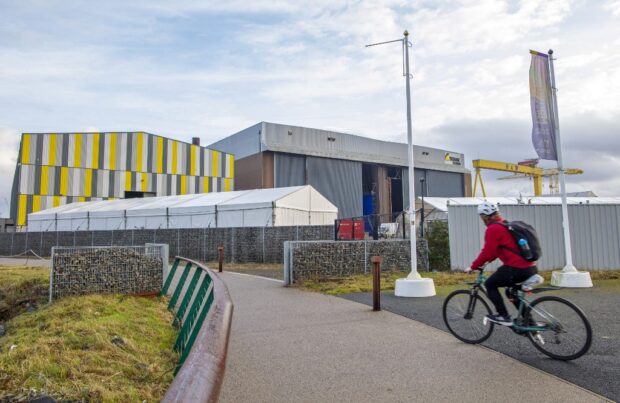Trading suspended in parent company of Titanic shipyard owner

Titanic Studios, in the shadow of the Harland and Wolff shipyard, are pictured in Belfast in Northern Ireland on November 30, 2022. A string of major recent cinematic and streaming projects made in the UK province have earned it a growing international reputation for TV and cinema production. Belfast’s once-mighty shipyards, which now house the Titanic Studios — among Europe’s largest — and the newer Harbour Studios, offered the huge spaces needed by blockbuster filmmakers. (Photo by Paul Faith / AFP)
London, United Kingdom — Trading in shares of the naval constructor Harland and Wolff, which owns the Belfast shipyard where the Titanic was built, was suspended Monday after the firm failed to publish independently audited accounts for 2023, when it recorded a loss of 43 million pounds ($50 million).
The company said it was in discussions with auditors on how to account for multiyear contract revenues that led to a publication delay beyond a June 30 deadline.
It is now due to publish the results in a week’s time, and trading of its shares — which have plunged nearly 38 percent this year — has been suspended until then.
READ: Belfast concert rocks Titanic shipyard
The unaudited accounts show that sales tripled last year to 86.91 million pounds, while the net loss shrank to 43.09 million pounds from 70 million in 2022.
The company expects to hit a revenue target of 200 million pounds for the current financial year, but uncertainty lingers over a government guarantee of bank loans for a similar sum.
A decision on the guarantee is expected after Britain’s general election on Thursday, but Harland and Wolff indicated that “significant delays” would hinder its ability to win new contracts.
Harland and Wolff was saved from bankruptcy in late 2019 thanks to a six million pound buyout by British energy infrastructure company InfraStrata, which has since adopted the name of its subsidiary.
READ: Operator of Titanic sub that imploded suspends all expeditions
The shipyard, founded in 1861, was the construction site of the Titanic, which sank during its inaugural voyage in April 1912 after hitting an iceberg off the coast of Newfoundland, resulting in the deaths of nearly 1,500 passengers.
It also constructed numerous military vessels during World War II as well as the Myrina tanker, the first so-called supertanker built in Britain.
It had nonetheless struggled in recent decades though it said Monday that current orders, including for the British navy next year, had boosted operations and prompted an increase in its workforce to 1,512 people from 1,010 late last year.